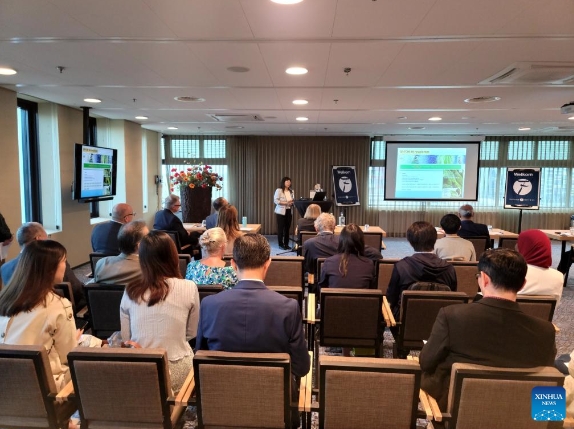European, Chinese scholars join hands to advance traditional Chinese medicine

This photo taken on Sept. 18, 2023 shows the 2023 annual meeting of the Good Practice Traditional Chinese Medicine Research Association (GP-TCM RA) in Leiden, the Netherlands. European and Chinese scholars were building a collaborative bridge in the field of traditional Chinese medicine (TCM) as they held their annual academic meeting here, a tradition that has spanned the past decade. (Xinhua/Wang Xiangjiang)
European and Chinese scholars were building a collaborative bridge in the field of traditional Chinese medicine (TCM) as they held their annual academic meeting here, a tradition that has spanned the past decade.
In Leiden, a city in the Dutch province of South Holland, about 50 scholars from China and European countries, such as the Netherlands, Germany, Britain, Italy, Austria, Norway, Belgium and Poland, participated in the 2023 annual meeting of the Good Practice Traditional Chinese Medicine Research Association (GP-TCM RA), a non-profit international academic research institution founded in 2012.
During the three-day meeting, which concluded on Wednesday, they shared their latest research findings and discussed strategies to promote TCM for the benefit of people in need around the world.
Dr. Wang Mei, president-elect of GP-TCM RA and co-chair of the organizing committee of this year's event, highlighted the significance of TCM in Europe.
TCM, with its holistic and multifaceted approach to healing, is different from Western medicine's single-target, single-function treatment methods, she told Xinhua, adding that this uniqueness, rooted in TCM's ability to align with the complexities of the human body's physiological mechanisms, serves as a major advantage.
Wang underscored the complementarity between TCM and Western medicine. While the latter introduced systems biology in the 1990s, it still lacks comprehensive tools for treating diseases from a holistic perspective. Thus, the collaboration between TCM and Western medicine offers new opportunities for development in both medical systems.
Another advantage of TCM is preventive healthcare. Through diagnostic methods like "inspection, auscultation and olfaction, inquiry and palpation," TCM practitioners can identify potential health issues. Europe, therefore, seeks to harness TCM's preventive capabilities through scientific research, Wang added.
In 2015, Chinese scientist Tu Youyou won the Nobel Prize in Physiology or Medicine for the discovery of artemisinin. Tu's work demonstrated that this Chinese herbal medicine contains active compounds with therapeutic potential, further enhancing TCM's global reputation.
Chinese herbal medicine and acupuncture, among other TCM therapies, have also proved to be effective in combating COVID-19, gaining widespread recognition worldwide, Wang said. These accomplishments continue to elevate TCM's profile in Europe and across the globe.
Professor Robert Verpoorte, a botanist at Leiden University and co-chair of this year's meeting, told Xinhua that both TCM and Western medicine possess unique characteristics and strengths. Integrating the two can lead to a more comprehensive understanding of ailments and their causes, offering a promising direction for future medical practice.
He cited examples where TCM's observation methods could significantly enhance treatment when combined with Western diagnostic methods.
Since being established in Leiden in April 2012, the GP-TCM RA's annual meeting has attracted experts and scholars from around the world, serving as platforms for discussing the latest developments and challenges in the field of TCM.
As for understanding the human body, people often think that "we only know the tip of the iceberg," but the fact is we hardly know "a snowflake of an iceberg," Verpoorte told Xinhua. "That is our level of understanding, very, very little."
Therefore, in the field of medicine, open communication and international cooperation are essential, he said, adding that sharing knowledge can accelerate medical progress, benefiting all of humanity.
Editor:伏娅敏
